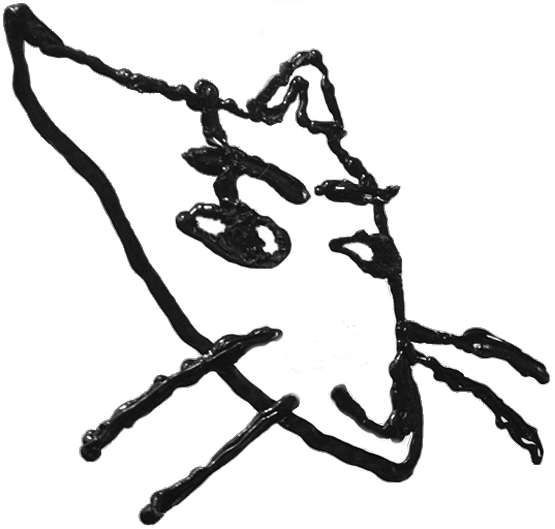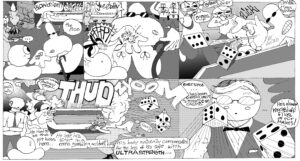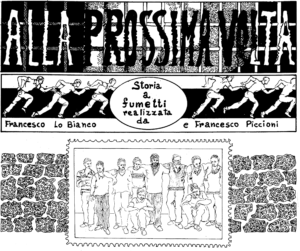First published in Papéis Avulsos (1882). Translated from the version in Obra Completa (Rio de Janeiro: Nova Aguilar, 1994, vol. 2) by Cecília Resende Santos.
The MOST Serene Republic
(A conference by the canon Vargas)
Gentlemen,
Before communicating to you a discovery, which I believe to be of some distinction to our country, let me express my gratitude for the readiness with which you have responded to my call. I know that a higher interest has brought you here, but I do not ignore either—and it would be ungrateful to ignore it—that a bit of personal sympathy is mixed with your legitimate scientific curiosity. I hope I can measure up to both.
My discovery is not recent; it is from the end of the year 1876. I did not make it public then—and, if it wasn’t for the Globe, interesting daily of this city, I still would not divulge it today—for a reason that your spirit will readily understand. This work I came to tell you about still lacks some last touches, verifications, and supplemental experiments. But the Globe broke the news that an English intellectual discovered the phonetic language of insects, and mentioned the study conducted with flies. I wrote to Europe right away and await an answer anxiously. If it is a fact, however, that a foreigner’s name is glorified for the feat of air travel, an invention of Father Bartolomeu, while our peer’s name is barely remembered by his fellow countrymen, I decided to avoid the fate of the notable Flyer and come to this tribune to announce loud and clear, in the face of the universe, that long before that sage, and outside the British islands, a humble naturalist made an identical discovery, and made of it something superior.
Gentlemen, I will astonish you, as I would have astonished Aristotle, if I had asked him: Do you believe it is possible to give spiders a social regime? Aristotle would have answered in the negative, along with all of you, because it is impossible to believe that we could ever succeed in socially organizing this skittish arthropod, solitary, inclined only to work, and hardly to love. Very well, this impossibility I have achieved myself.
I hear laughter, amidst whispers of curiosity. Gentlemen, you must overcome your prejudices. The spider seems inferior to you precisely because you don’t know it. You love the dog, you praise the cat and the chicken, and you don’t realize that the spider doesn’t jump or bark like a dog, it doesn’t meow like a cat, it doesn’t cackle like a hen, it doesn’t buzz or bite like a mosquito, nor does it steal our blood and our sleep like the flea. All these animals are the consummate model of idleness and parasitism. The same ant, so highly praised for certain good qualities, attacks our sugar and our farms, and builds up its property by stealing from others. The spider, gentlemen, does not afflict or defraud us; it catches flies, our enemies; it spins, weaves, works, and dies. Is there any better example of patience, of order, of predictability, of respect, and of humanity? With respect to its talents, there’s no two ways about it. From Pliny to Darwin, naturalists from across the world converge in admiration of this little critter, whose marvelous web your maid’s unconscious broom destroys in less than a minute. I would repeat again these propositions, if I had time; the matter, however, exceeds its due term, and I am obliged to abridge it. I have them here, not all, but almost; I have among them this excellent dissertation by Büchner, who so subtly studied the psychic life of animals. In citing Darwin and Büchner, I of course pay due respect to these two first-class intellectuals, without in any way absolving (and my tog announces it) the gratuitous and erroneous theories of materialism.
Yes, gentlemen, I have discovered a species of arachnid that possesses the faculty of speech; I have collected a few, and then several of these new arthropods, and I organized them socially. The first specimen of this wonderful spider appeared on December 15, 1876. It was so vast, so colorful, with a crimson back and diagonal blue stripes, so quick in its movements, and sometimes so joyful that it captivated my attention entirely. The next day, three more arrived, and the four of them took possession of a corner of my ranch. I studied them at length; I found them admirable. Nothing, however, compared to my bafflement upon discovering the arachnid tongue; a language, gentlemen, nothing less than a rich and varied language, with a syntactic structure, verbs, conjugations, declinations, Latin cases, and onomatopoeic forms, a language for which I am writing a grammar for the use of academia, as I have done summarily for my own use. And I have done so, it must be remarked, by surmounting the harshest difficulties with extraordinary patience. Twenty times I lost heart; but the love of science gave me strength to finish a job that, I can declare today, could not be done twice in a single man’s lifetime.
I will save for another opportunity the technical description of my arachnid, and the analysis of the language. The objective of this conference is, as I said, to safeguard the rights of Brazilian science, by means of a timely protestation; and, having done that, to tell you how I believe my work to be superior to the English intellectual’s. I must demonstrate it, and I call your attention to this point.
Within a month I had twenty spiders with me; the next month, fifty-five; in March 1877 I had four hundred and ninety. Two forces were particularly important in the enterprise of congregating them: the use of their language, as soon as I had a sufficient grasp of it, and the feeling of terror I infused in them. My stature, the garment reaching to the heels, the use of the same language, made them believe that I was the god of spiders, and since then they have adored me. And regard the benefit of this illusion. As I watched them with much attention and thoroughness, jotting down in a book my observations, they concluded that the book was a record of their sins, and became even stauncher in the exercise of virtue. The flute was also a great aid. As you know, or should know, they are crazy for music.
It wasn’t enough to associate them, however; it was necessary to give them a legitimate government. I hesitated in the choice; many of the current systems seemed good, some excellent, but all had against themselves the fact of existing. I will explain. An active form of government becomes exposed to comparisons that may diminish it. It was necessary to either find a new model, or restore an abandoned one. Naturally I adopted the second endeavor, and nothing seemed better to me than a republic, in the fashion of Venice, the same mold, even the same epithet. Obsolete, with no analogy, in its general shape, to any living government, it had the additional advantage of a complicated mechanism,– which would put to the test the political aptitudes of the new society.
Another reason determined my choice. Among the different electoral modes of ancient Venice, there was that of the bag and balls, the initiation of the sons of nobility to public service. They would place balls with the names of the candidates in a bag, and every year pull out a certain number, and from there on those elected would become fit for public careers. This system will make the doctors of suffrage laugh; but not me. It excludes the follies of passion, the maladroitness of ineptitude, the congress of corruption and greed. But this was not the only reason why I accepted this system; being this people so skilled in the spinning of its webs, the use of the electoral bag was of easy adoption, almost a native plant.
The proposition was accepted. The Most Serene Republic seemed to them a magnificent title; soaring, expansive, apt to ennoble the popular oeuvre.
I will not say, gentlemen, that this work has reached perfection, nor that it will reach it any time soon. My pupils are not Campanella’s Sun citizens or Morus’s Utopians; they form a recent people that cannot simply skip ahead to the pinnacle of secular nations. Nor is time a worker who would give to another his file or his pickaxe; he will do more and better than theories can do on paper, valid there and lacking in practice. What I can tell you is that, the uncertainties of the age notwithstanding, they march on, possessing a few virtues which I presume essential for the longevity of a State. One of them, as I said, is perseverance, a long patience of Penelope, as I am about to show you.
Effectively, as soon as they understood that the electoral act was the basis of public life, they made sure to exercise it with the greatest care. The fabrication of the bag was a national effort. It was a bag measuring five inches in length and three inches in width, woven with the finest threads; a thick and solid work. Ten principal dames were acclaimed to assemble it, and they received the title of mothers of the republic, in addition to other privileges and positions. It was a masterpiece, I can assure you. The electoral process is simple. The balls receive the names of candidates who demonstrate certain conditions, written by a public officer, denominated “of inscriptions”. On the day of the election, the balls are placed in the bag and taken out by the officer of extractions, until the number of electees is reached. This, which was simply an initiation process in ancient Venice, serves here to fulfill all positions.
Elections were first done very regularly; but, soon after, one of the legislators declared that the process had been tainted, for two balls with the same name had been introduced. The chamber verified the exactitude of the accusation, and declared that the bag, until then three inches wide, would be reduced to two; in limiting the capacity of the bag, the space for fraud would be restricted, as good as suppressing it. However, in the next election, a candidate was not entered in the election, we don’t know if due to oversight or intention of the public officer. The officer declared that he did not remember seeing the distinguished candidate, but added honorably that it was not impossible that he might have indeed given his name; in this case there was no exclusion, but distraction. The chamber, faced with an ineluctable psychological phenomenon such as distraction, could not punish the officer, but, concluding that the narrowness of the bag could give room for odious exclusions, revoked the previous law and restored the three inches.
Meanwhile, gentlemen, the first magistrate passed away, and three citizens came forward as candidates to the position, only two of them of importance. Hazeroth and Magog, the very presidents of the rectilinear and curvilinear parties. I must explain these denominations. As spiders are primarily geometers, geometry is what divides them in politics. Some understand that all spiders must make webs with straight threads; it is the rectilinear party. Others think, on the contrary, that webs must be worked with curved threads; it is the curvilinear party. There is yet a third party, mixed and central, with this postulate: webs must be made with straight and curved threads, it is the recti-curvilinear party; and finally, a fourth political division, the anti-recti-curvilinear party, that made tabula rasa of all litigation principles, and proposes the use of webs spun of air, a transparent and light work, in which there are no lines of any kind. As geometry could only divide them, without ever quite inspiring passion, they adopted a symbolic one. For some, a rectilinear line expresses good sentiments, justice, honesty, integrity, consistency, etc., while bad or inferior sentiments such as sycophancy, fraud, disloyalty, perfidy, are perfectly curved. Their opponents retort that no, the curved line is virtue and wisdom, because it is an expression of modesty and humility; in contrast, ignorance, pretentiousness, folly, boastfulness, are straight, sharply straight. The third party, less angular, less exclusivist, rejected the exaggerations from both sides, combined the contrasts, and proclaimed the simultaneity of lines as the exact copy of the physical and moral world. The fourth sticks to denying everything.
Neither Hazeroth nor Magog were elected. Their balls came out of the bag, it is true, but were deemed unusable, the first for lacking the first letter of the name and the second for lacking the last. The remaining and victorious name was that of an ambitious and moneyed man, an obscure politician, who quickly rose to the ducal seat, to the general astonishment of the republic. But the vanquished did not contently sleep over the laurels of the winner; they requested an inquiry. The investigation revealed that the officer of inscriptions intentionally corrupted the orthography of their names. The officer confessed the fault and the intention, but explained that they constituted a simple ellipsis; a purely literary offense, if one at all. As it was not possible to persecute someone for faults of orthography or figures of speech, it seemed right to revise the law. On this same day it was adjudged that the bag would be made of a mesh fabric, through which the balls could be read by the public and, ipso facto, by the candidates themselves, who would then have time to correct the inscriptions.
Unfortunately, gentlemen, eternal malice is the commentary of law. The same door opened to serve honesty served also the cunning of a certain Nabiga, who conspired with the officer of extractions to obtain a seat in the chamber. There was one seat and three candidates; the officer extracted the balls with eyes on his accomplice, who only stopped shaking his head negatively when his ball was grasped. That was all it took to condemn the mesh idea. The chamber, with exemplary patience, restored the thick fabric of the previous regime, but, to avoid other ellipses, determined the validity of the balls with incorrect inscriptions, if five people swore that the name written was the name of the candidate.
This new statute gave place to a new and unforeseen situation, as you will see. They set out to elect a collector of sportulas—an official responsible for charging public fees in the form of voluntary sportulas. Among others, a certain Caneca and a certain Nebraska were candidates. The ball extracted was Nebraska’s. It was incorrect, certainly, as the last letter was missing; but five witnesses swore in the terms of the law that the elected was the republic’s own and only Nebraska. The case seemed closed, when candidate Caneca requested to prove that the ball did not have Nebraska’s name, but his own. The justice of the peace granted the petition. Then came a great philologist, perhaps the first of the republic, also a good metaphysic, and not a bad mathematician, who proved the matter in the following terms: In the first place, he said, you must note that the absence of the last letter of the name Nebraska is not fortuitous. Why was it written incompletely? One could not say by fatigue or love of brevity, for only the last letter is missing, a simple a. Need of space? That neither; see: there is still space for two or three syllables. Therefore, the lack is intentional, and the intention cannot be other than to call attention to the letter k, the last one written, forsaken, unmarried, directionless. Well, for a mental effect, which no law has destroyed, the letter is rendered in the brain in two ways, the graphic form and the sonic form: k and ca. The defect, then, in the written name, drawing the eyes to the last letter, sets right away in the brain this first syllable: Ca. That said, the natural movement of the spirit is to read the entire same; returning to the beginning, to the initial ne, of the name Nebrask — Cane. All that remains is the middle syllable, bras, the reduction of which to this other syllable ca, the last in the name Caneca, is the most demonstrable thing in the world. And, yet, I will not demonstrate it, as you lack the necessary preparation to the understanding of the spiritual or philosophical significance of the syllable, its origins and effects, phases, modifications, and consequences — logical and syntactical, deductive or inductive, symbolical and others. But, assuming the demonstration, there is the proof, evident, clear, of my original affirmation by annexation of the syllable ca to the two Cane, resulting in the name Caneca.
The law was amended, gentlemen, abolishing the option of witness and interpretive proof of the texts, and introducing an innovation, the simultaneous cut of half an inch in length and half an inch in width of the bag. This amendment did not prevent a small abuse in the election of the alcaides, and the bag was restored to its original dimensions, now given, however, a triangular shape. You see, this shape had a consequence: many balls gathered at the bottom. Thus the change to the cylindrical shape; later yet it was given the form of an hourglass, which was found to have the same inconveniences as the triangle, and then the form of a crescent was adopted, etc. Many abuses, neglects and loopholes tend to disappear, and the rest will have the same fate, not entirely, of course, for perfection is not of this world, but according to the measures and terms of the counsel, one of the most circumspect citizens of my republic, Erasmus, whose last speech I regret not being able to share with you in full. Tasked with notifying the last legislative resolution to the ten dames charged with weaving the electoral bag, Erasmus told them the fable of Penelope, who wove and unwove the infamous web, as she awaited her spouse Ulysses.
You are the Penelopes of our Republic, he said as he finished; you have the same chastity, patience and talents. Remake the bag, my friends, remake the bag, until Ulysses, tired of running around, returns to take among us the place that is his. Ulysses is Wisdom.




